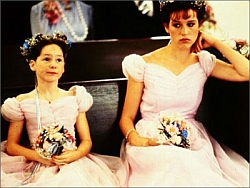I have a friend, a warm and delightful person, to whom I can turn for advice, insight and a felt sense of indefinable uplift. His intuitive power and intelligence are self-evident. As he talks with me in easy conversation I feel safe and confident in his ability to take a balanced and compassionate view.
Until I say the wrong thing. Then the door to his empathy slams shut, his wisdom is replaced by harsh judgment and I’m somehow left feeling as though I’d been cynically tricking him into thinking I liked him.
Such occurrences are not unusual in the world of the gifted. Often our societal presentation seems like a very thin veneer, just waiting for some circumstance to crack it and expose the defensive vehemence within.
Seventy going on seven

Seven and seventeen - but which one's which?
In many individuals, the contrast between the ‘old soul’ wisdom and the near-infantile wounded beast is often so great that – in therapeutic circles at least – it gives rise to all sorts of pathologizing. “He’s borderline” is a common cry; or: “Ambivalent attachment disorder” or some other interpretation.
In society at large, there’s a different form of judgment: “S/he’s old enough to know better!”
Truly, this is the “Seventy going on Seven.” syndrome: the daily occurrence of ‘ordinary aberrational behavior’. It won’t get you hospitalized or locked up, but it might leave your friends and colleagues a bit more wary of you than they were before.
Of course, it’s always more pleasant to find this behavior in others because that means we don’t have to look for it in ourselves. But it’s almost certainly there.
It’s not just ‘them’
That’s because psychological maturity does not follow the easy metrics of physiological and intellectual development. There are no psycho-birthdays at which you’re guaranteed to be emotionally a year older. There are no psycho-academic exams whose results will prove your growing mastery of interpersonal relations, say, or grief management.

It's not fair! I'm only two!
However, a form of development does take place which I shall call emotional/behavioral (E/B) development.
E/B development has been studied under many different labels: moral development, ego development, personality development and emotional intelligence just to name a few. The work of those researching it makes one thing very clear: our E/B development is erratic and inconsistent.
Every researcher has come up with a developmental model consisting of a number of stages. And they all agree on these two facts:
- We don’t develop chronologically step by step; and
- Our development is not made manifest uniformly across all situations.
In other words, our E/B age – and thus the basis for our response to any situation – is dictated by the context in which the situation arises.
So, if I’m asked my opinion over a beer in the pub, I’ll sit back, relax, and give it to you from the peak of my E/B understanding. If I’m asked for the same opinion in an exam room with a limited time to respond and my life’s career hanging on the answer, I’ll regress to an earlier level of E/B development and try to give ‘them’ the answer they want me to.
This highlights a natural law of great significance: Under stress we regress.
Under stress we regress
How far do we regress? It depends on the stress level, but we can return to the earliest stage of development.
We can and do revert to complete infancy. Sobbing while in the foetal position is not uncommon even among adults so apparently ‘together’ that their judgments are revered by the public at large.

Ambiguous message: Regressive? Aggressive? or just Expensive?
Some forms of regression are less obvious. These include reaching for the booze, the cigarettes or other drugs, or heading for the stores. Those must-have shoes at that darling boutique are just another indication that something’s wrong.
Unless, of course, your livelihood depends on them.
What to do?
Like most things, it’s easier to see regression occurring in others than it is in oneself. So start there. When the person you’re talking to becomes fiery or adopts an inappropriately childish tone, don’t just react negatively. Recognize that they’re under stress and ask yourself (and perhaps them) what that stress might be.
Remember that there is no correlation between physical and emotional maturity, nor between intellectual and emotional maturity. Also, that the person who is wise in one environment may be a scared child in another. Not because of some defect but because that’s the way nature made us.
Finally, our tendency to regress is eased by consistent attention to self-examination. Not by harsh self-condemnation but by open-minded curiosity. The question: “I wonder what made me respond like that?” is a growth-step; while: “What the devil did I do that for?” will keep you firmly in whatever stage you’re currently held.
Inch by inch (or perhaps in this metric age that should be millimeter by millimeter !), your brilliantly illuminating articles will help (for FREE) to build a world of greater understanding and tolerance, both of our own selves and of our fellows — a knighthood would not be enough … what then; beatification ?!! Ah yes, Saint Christopher; of course, the patron of all travellers along life’s bumpy road.
A heart-felt thank-you for your excellent and insightful posts.
That’s kind of you Graham, but beatification? I’m not so sure I’d want it. The man I’m named after had to lose his head before he was so ‘honored’. Mind you, they did tempt him with “two fair women” first . . .
Interesting insight – but I see this kind of behavior in all kinds of people – from top executives to mail room clerks – it depends on the situation – people can surprise you with their wisdom and surprise you again with their immaturity – but what is immaturity? To whom is it immature? Isn’t it all just stress reactions and mostly, the levels of stress? Different people react quite differently – in a non-emergency, some can be quite calm; in a dire emergency, unexpectedly, they completely fall apart. Others who seem imbalanced can be quite calm and rational in acute situations yet “crazy” in completely normal situations.
I have real problem with emotional maturity as a concept because all people can be all things depending on the situations they can either handle or not.
Interesting. I had terrible modelling as a child,by 2 insane carbon units who always catastrophised over minute nonsense. So I have great difficulty not doing same.Still,after reading this,I was doing a painting when I dropped a brush full of paint onto carpet,which usually would have had me cursing like hell,but this time,I picked it up and never said a word.So I thank you for that. It may not last,but it is certainly in forefront of my mind now,and will be for a while.